
Led Zeppelin is the first album by the English rock band Led Zeppelin. It was released on 13 January 1969 in the United States and on 31 March 1969 in the United Kingdom by Atlantic Records.

Led Zeppelin III is the third album by the English rock band Led Zeppelin, released on 5 October 1970. It was recorded in three locations. Much of the work was done at Headley Grange, a country house, using the Rolling Stones Mobile Studio. Additional sessions were held at Island Studios and Olympic Studios in London. As with the prior album, the band eschewed the use of guest musicians, with all music performed by band members Robert Plant (vocals), Jimmy Page (guitars), John Paul Jones, and John Bonham (drums). The range of instruments played by the band was greatly enhanced on this album, with Jones especially emerging as a talented multi-instrumentalist, playing a wide range of keyboard and stringed instruments, including various synthesizers, mandolin and double bass, in addition to his usual bass guitar. As with prior albums, Page served as producer on the album, with mixing done by Andy Johns and Terry Manning.
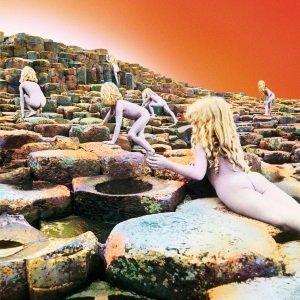
Houses of the Holy is the fifth album by the English rock band Led Zeppelin, released on 28 March 1973 in the United States and on 30 March 1973 in the United Kingdom by Atlantic Records. The album benefited from two band members installing studios at home, which allowed them to develop more sophisticated songs and arrangements and expand their musical style. Several songs subsequently became fixtures in the group's live set, including "The Song Remains the Same", "The Rain Song" and "No Quarter". Other material recorded at the sessions, including the title track, was shelved and released on the later albums Physical Graffiti (1975) and Coda (1982). All instruments and vocals were provided by the band members Robert Plant (vocals), Jimmy Page (guitar), John Paul Jones, and John Bonham (drums). The album was produced by Page and mixed by Eddie Kramer. The cover was the first for the band to be designed by Hipgnosis and was based on a photograph taken at Giant's Causeway in Northern Ireland.

Physical Graffiti is the sixth album by the English rock band Led Zeppelin. Released as a double album on 24 February 1975 in the United States and on 28 February 1975 in the United Kingdom, it was the group's first album to be released under their new label, Swan Song Records. The band wrote and recorded eight new songs for the album in early 1974 at Headley Grange, a country house in Hampshire, which gave them ample time to improvise arrangements and experiment with recording. The total playing time covered just under three sides of an LP, so they decided to expand it into a double album by including previously unreleased tracks from the sessions for the band's earlier albums Led Zeppelin III (1970), Led Zeppelin IV (1971) and Houses of the Holy (1973). The album covered a range of styles including hard rock, progressive rock, rock 'n' roll and folk. The album was then mixed over summer 1974 and planned for an end-of-year release; however, its release was delayed because the Peter Corriston-designed die-cut album cover proved difficult to manufacture.
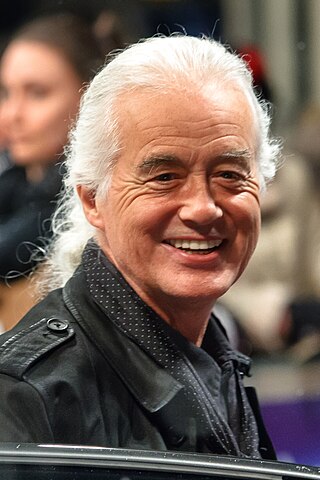
James Patrick Page is an English musician and producer who achieved international success as the guitarist and founder of the rock band Led Zeppelin. Prolific in creating guitar riffs, Page's style involves various alternative guitar tunings and melodic solos, coupled with aggressive, distorted guitar tones. It is also characterized by his folk and eastern-influenced acoustic work. He is notable for occasionally playing his guitar with a cello bow to create a droning sound texture to the music.

The Complete Studio Recordings is a ten compact disc box set by the English rock group Led Zeppelin, released by Atlantic Records on 24 September 1993. It contains all nine of the original Led Zeppelin studio albums digitally remastered, plus an expanded version of the posthumous release Coda. The discs are physically paired together in double-disc booklets and arranged in chronological order, with the exception of Presence being paired with Houses of the Holy in order to keep the two discs of Physical Graffiti together in the same case.

A Nice Pair is a compilation album by Pink Floyd, re-issuing their first two albums, The Piper at the Gates of Dawn and A Saucerful of Secrets in a new gatefold sleeve. The album was released in December 1973 by Harvest and Capitol in the United States and the following month in the United Kingdom by Harvest and EMI. It reached number 36 in the US Billboard album charts and was certified gold by the Recording Industry Association of America (RIAA) in March 1994.
Lucifer's Friend was a German rock band, formed in Hamburg in 1970 by guitarist Peter Hesslein, singer John Lawton, bassist Dieter Horns, keyboardist Peter Hecht, and drummer Joachim Reitenbach. The group was an early practitioner of heavy metal and progressive rock; they also incorporated elements of jazz and fusion into their music, especially in their fourth album Banquet of 1974. Beyond heavy metal, the band has been cited, too, as one of the pioneers of doom metal, helping to define both genres due to their heavy sound and dark oriented lyrics of their debut Lucifer's Friend of 1970, and returning to their roots in 1981 with Mean Machine, although more influenced by speed metal.
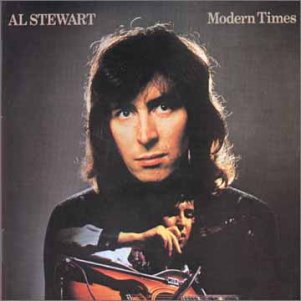
Modern Times is Al Stewart's sixth studio album, released in 1975. The album was re-released in 2007 with bonus tracks. A further remaster by Paschal Byrne was released on Esoteric Recordings in 2015.

Lucifer's Friend is the first studio album by the hard rock band Lucifer's Friend, released in 1970.

...Where the Groupies Killed the Blues is the second album by progressive rock band Lucifer's Friend, released in 1972. Piano is prominent on most songs, and organ is used only on a few songs such as "Where the Groupies Killed the Blues", whereas on the debut album, Lucifer's Friend (1970), organ and guitars had been the driving force.
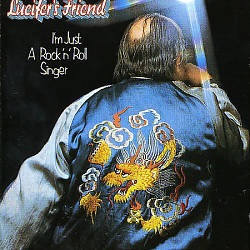
I'm Just a Rock 'n' Roll Singer is the third album released by progressive rock band Lucifer's Friend in 1973. This album marks the point where they completely turn away from dark lyrics and heavy metal sound.

Banquet is the fourth album by German progressive rock band Lucifer's Friend, released in 1974. By this time there was no hard rock sound, it was now strictly progressive rock mixed with jazz fusion. The song "Our World Is a Rock 'n' Roll Band" was the opening track on some versions of the original LP release, but the only CD releases to date do not include this track, which can instead be found as a bonus track on the Repertoire Records CD release of their self-titled debut.

Sneak Me In is the seventh album by Lucifer's Friend, an album in which Mike Starrs, formerly of Colosseum II, replaced John Lawton on vocals for a second time. This album and the previous Good Time Warrior (1978) were an attempt at a more commercial, accessible style which met with limited success. Starrs was replaced by the returning Lawton, for 1981's Mean Machine.

Good Time Warrior is the sixth album by Lucifer's Friend, an album in which Mike Starrs, formerly of Colosseum II, replaced John Lawton on vocals for the first time. This album and the following Sneak Me In (1980) were an attempt at a more commercial, mainstream style which met with limited commercial success. Starrs was eventually replaced by the returning Lawton for 1981's Mean Machine.

Mind Exploding is the fifth album by German hard rock band Lucifer's Friend. This album marks the point where they returned to a more hard rock oriented style with less of a progressive rock sound. It is more or less the missing link between I'm Just a Rock & Roll Singer (1973) and Banquet (1974); with the hard rock driven sound of the former, it still has the occasional horn section and progressiveness of the latter. This is the last album with John Lawton on vocals before he joined Uriah Heep. Lawton returned to Lucifer's Friend in 1981 to record the Mean Machine album.
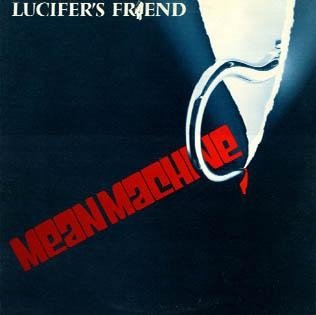
Mean Machine is the eighth album by German rock band Lucifer's Friend, released in 1981. It marks a return to heavy metal, coinciding with the regained popularity of the genre with the NWOBHM movement.

The Devil's Touch is the first of three compilation albums by Lucifer's Friend. This compilation collects some of Lucifer's Friend's best songs from their first album Lucifer's Friend (1970) up to Mind Exploding (1976). This compilation was released by Fontana Records in 1976. The other compilation would be released by Vertigo Records in 1980, which was called Rock Heavies: Lucifer's Friend.

Rock Heavies: Lucifer's Friend is the second of two compilation albums by Lucifer's Friend. This compilation collects some of Lucifer's Friend's best songs from their first album, Lucifer's Friend (1970), third album I'm Just a Rock & Roll Singer (1973), and fifth album Mind Exploding (1976). This compilation was released by Vertigo Records in 1980. This compilation is not as extensive as the Fontana Records release, The Devil's Touch (1976), in that it only includes three songs from Lucifer's Friend, one song from I'm Just a Rock & Roll Singer, and four songs from Mind Exploding.

Flash is the second and final album by Electric Food. Soon after its release, the core of band formed Asterix and recorded one album: Asterix. Less than a year later Asterix would change their name to Lucifer's Friend. In 2004 Electric Food and Flash were released on one CD by Mason Records. Both Electric Food albums sound very similar to Lucifer's Friend's debut but include strong influences from Led Zeppelin, Uriah Heep, and Spooky Tooth.


















